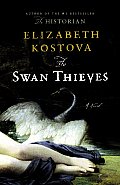
I've never suffered from a dearth of ideas for fiction — I seem to be surrounded, in a benignly insane way, by half-materialized characters (people, that is), gestures, settings, events, episodes, anecdotes, plot twists, bits of dialogues. Titles, on the other hand, are very difficult for me. Unless the idea for a piece of writing actually occurs to me in the form of a title, I find it nearly impossible to come up with one — with a good title, at any rate. This, despite the fact that I keep in my notebooks lists of titles that do not yet have stories, which are a little like characters in search of an author. To put it in the vernacular, titles make me crazy.
For one thing, all the great ones are already taken. Barchester Towers. Things Fall Apart. Robinson Crusoe. If you put 10,000 monkeys at 10,000 typewriters for the amount of time that has elapsed since Gondwana was rent asunder, those hapless simians would still be hard pressed to come up with all the fine titles that have already been used, the thousands or millions or trillions of excellent combinations of words someone has previously nabbed.
Titles for novels are the worst problem of all. In my experience, a poem may well sprout dicotyledonous from its title, and of course it can, in a pinch, take its title from a good first line. Short stories are more flexible, absorbent, forgiving of their titles, even if they are stringent in every other way possible. The title of a novel, however, is a Commitment. It must last the reader and (God help her/him) the weary novelist for a slog of somewhere between 180 and 1200 pages. It must suit the book and the book must suit it. It must be memorable without being flashy, unless the book's flashiness cries out for glitter, but this is a different case and frequently a dreadful one. It must not have been used, too prominently, anyway, on any other novel (see despondent second paragraph, above).
I attempted for eight years to find a title for my first novel, The Historian. Fortunately, it took me 10 years to write, so I had some time to make mistakes in that area. A couple of years ago, cleaning out the environmental disaster that constituted that book's drafts, I came across my original working list of titles. Most — no, all — of them are too embarrassing to record here, but near the end of the list I had jotted down, twice, the serviceable, sensible, low-heeled title the book finally received.
Of course, the definite article tends to work well in novel titles, but it gives a title weight that must be balanced somehow in the book. More than one savvy person warned me that the sheer plainness of this title might work against my manuscript in the end, but I persisted in enjoying its solid explanation of the book's subject(s). Thank goodness I didn't choose to entitle it — well, I won't go into those early possibilities. And several friends have mischievously suggested that I go on to serial novels about other professions: The Librarian, The Janitor, The Sculptor, and so on. (The Professor, The Body Artist, and The Archivist are already taken, of course.) But what can you expect when you hang around with other writers, who may also be groping for titles?
 The Swan Thieves, my recently released novel about painters, psychiatry, and the rise of French Impressionism, was equally difficult to name. It hung around title-less and forlorn for several years before a title for it fell into my lap, or in this case, into my morning coffee. I'd known for some time that the book needed a title that referred to swans, since the central (fictional) painting revolves around the myth of Leda, while another narrative painting in the story also involves swans, and others depict swans in the setting of the Bois de Boulogne. I scribbled all over the margins of a phonebook, grocery lists, and other items and repeatedly came up short. All the swan titles that seemed available to my brain were pretty — fatally so — and the novel includes considerable loss and even a little depravity.
The Swan Thieves, my recently released novel about painters, psychiatry, and the rise of French Impressionism, was equally difficult to name. It hung around title-less and forlorn for several years before a title for it fell into my lap, or in this case, into my morning coffee. I'd known for some time that the book needed a title that referred to swans, since the central (fictional) painting revolves around the myth of Leda, while another narrative painting in the story also involves swans, and others depict swans in the setting of the Bois de Boulogne. I scribbled all over the margins of a phonebook, grocery lists, and other items and repeatedly came up short. All the swan titles that seemed available to my brain were pretty — fatally so — and the novel includes considerable loss and even a little depravity.
My release came with morning coffee, as I've mentioned; I was sitting one day with my mother and a novelist friend at a sidewalk table located, alas, next to a parking lot — strip commercial, in other words, that bane of American landscape. Adjacent to this café is a condo development that aspires, just a little, to Versailles, compensating for its dismal buildings with a fountain-crowned pond. Normally a pair of swans floated there — they mate for life, as you may know — and that day, as we sat over our coffee, I noticed the swans were missing. "Oh, it was in the paper," my mother told me. "Someone stole them."
I found this horrifying, I'll admit. "Who would steal a swan?"
And my novelist friend, loveliest of smart alecks, said without hesitation, "Swan thieves, of course."
We all laughed, sadly, but I also wrote the phrase down on my napkin and stuffed the napkin into my purse. When your title lands on your shoulder — that would be a smaller bird, I suppose — you do steal it at once. Ultimately, these few words, uttered in jest, became not only the title of my novel-in-progress but also of a revised painting around which the story is spun, a painting that is more than a painting. In other words, it is now a title doubled and the discovery of that phrase reshaped the book I had nearly finished when I plucked my title out of the air. But I recognize a stroke of luck for what it is; I'm considering thinking of titles first, in future, and novels to match them, second.